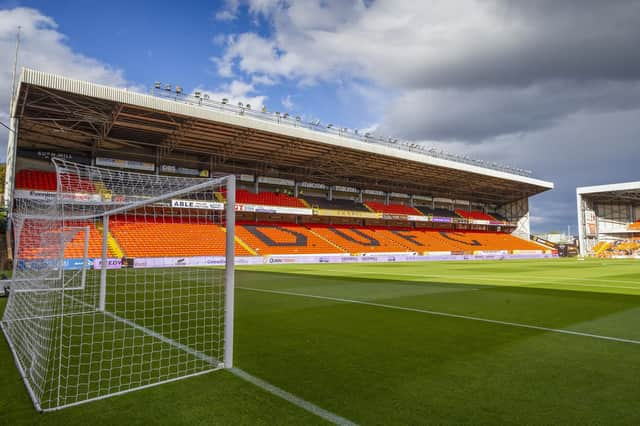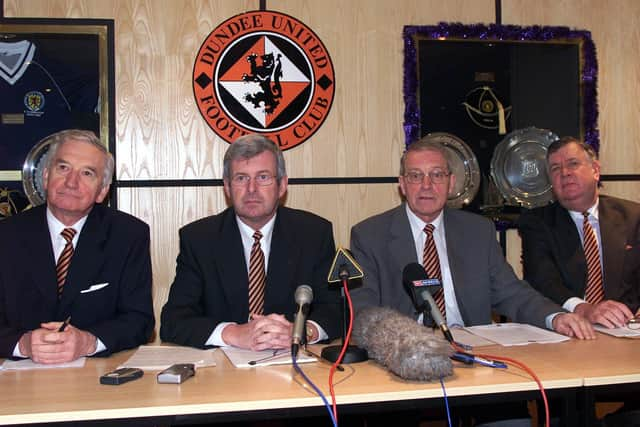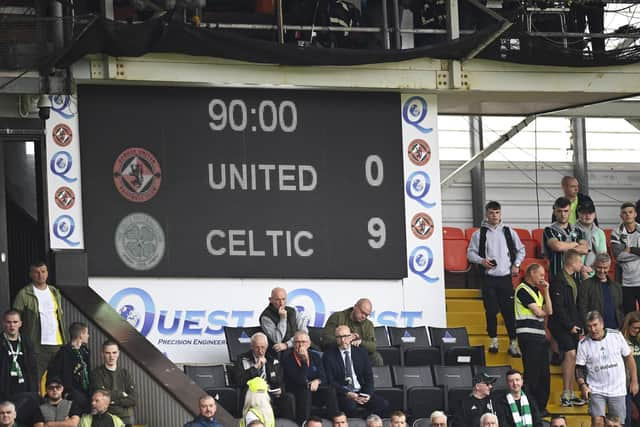Dundee United's struggles recall the importance of Ernest; dismay at loss of Tannadice lounge as Robertson family link ends


Jousting with Giants, Jim McLean’s autobiography written in conjunction with Ken Gallacher and published in 1987, remains a touchstone text. Perhaps some club officials should give it a read sometime.
McLean clearly valued such qualities as loyalty and trust. Reflecting on the 1979 League Cup final victory over Aberdeen, the club’s maiden major trophy win, the legendary manager writes: “I can still recall standing in the boardroom at Tannadice a few hours after winning the League Cup and Ernest Robertson, who had a long, long connection with the club, was standing in front of the drinks cabinet with tears in his eyes. He told me then: ‘I never thought I would see this day here. I never thought I would see the club winning one of the major honours.’”
Advertisement
Hide AdAdvertisement
Hide AdRobertson, for the benefit of those who don't know, including some in the United hierarchy it seems, is one of the most important figures in the club’s history – arguably the most important.


As much as United have endured a trying few weeks recently, they have come through much more challenging periods before and prospered. Robertson was a steady hand at the tiller and, long before Jack Ross’s blink-and-you-missed-it reign, he, too, cut a dash; in team pictures from the late 1920s and 30s he can be seen wearing plus fours.
Robertson steered United through difficulties again and again and implemented the innovative Taypools lottery scheme. The Robertson family’s direct involvement with Dundee United can be traced back to 1929 – just six years after the club became known as Dundee United.
And yet there is scant mention of Robertson, the club’s longest serving chairman and board member, at Tannadice today.
There isn’t, certainly, a stand named after him. McLean, who died on Boxing Day two years ago, has been honoured by a statue, rightly so. But knowing him, he would have put a hand on sculptor Alan Herriot’s arm before the first groove was carved in the maquette and asked him to reconsider his subject.


“Mr Ernie Robertson was, in my opinion, responsible for Dundee United surviving the late 1940s and early 1950s when his business paid the bills and wages at Tannadice,” McLean told the Courier in a 1996 interview to mark 25 years at the club.
In short, there would not have been so much as one victory over Barcelona, never mind four, and much else besides, without Ernest Smith Robertson.
All of this is relevant because United have just emerged from a period that demanded a trawl through the annals. The 9-0 defeat to Celtic one week ago eclipsed United’s previous record home defeat of 7-0. That loss in March 1957 to Morton occurred on Robertson’s watch as chairman and remarkably, it wasn’t even the first time United had conceded seven that Spring.
Advertisement
Hide AdAdvertisement
Hide AdIn fact, they did so in three successive games. Robertson’s response to such dark times included re-mortgaging the family soft drinks business.
One more, far more important, reason to reflect on the family’s legacy was news that Robertson’s son Bruce, another fine United servant, had passed away at the age of 84 in late July. He was tasked with fulfilling a very specific deathbed promise when his own father died in 1981 aged 89. “It wasn’t ‘look after your mother’,” explained eldest son Steve. “It was: ‘look after Dundee United’.”
And he did. Bruce inherited what was effectively a majority shareholding after his father died. A portion of these shares was sold back to the club for a nominal amount in accordance with Ernest’s expressed wish that the sitting board always had first option – indeed, some were then given to McLean in the hope of convincing him to stay amid offers from rival clubs, including Rangers.
Later, after refusing to entertain selling his remaining shares to Angus Cook, the Dundee chairman who was seeking to merge the clubs, Bruce was invited to follow in his father’s footsteps and serve on the board.
“My father took over that mantle in a different era by which time there were enormous financial interests and costs of running the club,” said Steve. “He had to make several heart-breaking decisions which he felt were right at the time to honour his father’s wishes even though they came back to haunt him in the end and led to him subsequently having to give up his directorship and involvement in the club.”
Some of these very shares released by the Robertson family were used to oust Bruce from the board in 2002 on a night of the long knives when McLean succeeded in forcing his way back into the club. This was shortly after apparently agreeing to sever ties following the on-camera assault on reporter John Barnes in October 2000.
“It is likely the last time there will be a mention of my father’s – and his father’s – contributions to the club they both loved," Steve, who runs The View restaurant in Wormit, told me. "I feel compelled to at least get some of their story honoured at this time.”
This desire has been strengthened by the dismaying recent discovery that there is no longer an Ernest Robertson lounge at Tannadice. Once located in the George Fox stand, it has been subsumed by a larger sponsors’ lounge. The change took place in 2017 under previous owners but no one thought to inform the Robertson family. To be fair to the club, efforts are now being taken to address the situation but it’s another lamentable example of football’s soul being sacrificed at the corporate altar. It’s more a case of carelessness than badness on United’s part but then that’s equally unforgivable.
Advertisement
Hide AdAdvertisement
Hide AdThe club’s new motto “United in pursuit” has become a source of mirth amid the team’s struggles. It seeks to convey a sense of looking ahead. New challenges, new ambitions. That’s fair enough. Commendable, even.
But don’t adopt this approach at the expense of forgetting what’s gone before. Don’t look back? Bob Dylan, who adopted this manifesto in his mid-1960s heyday, might be a genius, but he didn’t get everything right. It pays to look back if it means avoiding making mistakes in the present.
Comments
Want to join the conversation? Please or to comment on this article.